You can listen to the audio tracks of the interview or read the interview below.
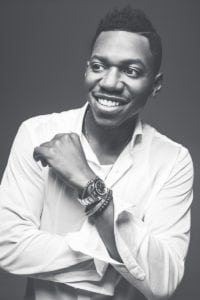
I first experienced Chris Blue when he was 11 or 12.
You could see the light then. He was the lead singer of the family singing group The Blue Brothers. Many called them the gospel Jackson 5. He was their “Michael.”
I knew they had something special. Anyone with eyes and ears did. But they were always “almost” famous. The group never really got their shot.
Chris moved back home to give it one more try. The plan didn’t gel perfectly, but Chris couldn’t and wouldn’t give up. When Chris called me wanting to move back to Knoxville, I knew if he could be connected to the right people and experiences he could move in the direction of his destiny.
Under the tutelage of Paul Jones at Cokesbury and Travis Wyrick at Lakeside studios, Chris began to flourish.
One day we decided to dream even bigger. We went to Lakeshore Park to dream big on paper. As we sat near a chapel on the property, I drew a box and put everything he was currently doing in the box. I then asked him to dream without limits. We dreamed all over that legal pad and most of the dreams were too big for the box.
I asked him if God could use him outside the box. It was an emotional moment.
What is amazing about this one part of Chris’ story is that when we returned with Cityview magazine a year later to do a photo shoot, the park had removed two exterior walls of the chapel to turn it into a useable public structure. The metaphor of the absent walls as a visual for living outside of a box stunned us both.
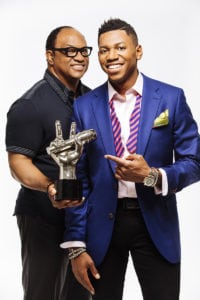
Photo by Bryan Allen
Hallerin Hilton Hill: When did you first hear yourself sing and say, “This feels like me”?
Chris Blue: This all started back in Florida. My mom would bring the brothers together and sing and go to churches. I was four years old, and we had our very first concert, and I remember watching The Canton Spirituals on television and wanting to be like them. I was on stage singing one of the songs, and I heard myself sing it. I was like, “Oh my god this feels good. I feel like I could do this forever and be good at it.” That’s the first moment, at age four, that I realized that I wanted to sing forever.
H: What was the song?
B: The song was “I Come from a Poor Family,” but it’s a lingo—so it’s po’ instead of poor: I come from a po’ family.
H: So, at four, were you poor?
B: At four years old, we were extremely poor.
H: But you probably didn’t know you were poor?
B: No, I knew. Even at four years old I knew because all of my friends around me had things that I never had. So, maybe the term wasn’t “poor” that I recognized, but I just knew something was different between my family and my friends’ families. They had things that we could only imagine having.
H: So, you start singing with your brothers. At four were you the lead singer of the Blue Brothers?
B: Yes. At four years old, I became the lead singer of the Blue Brothers. We would travel everywhere, and I’d be
the front man.
H: You did that for years, though. Did you ever have any frustration? Because as you start to sing, you start to get attention.
B: Absolutely. You know, I always had a dream to be a gospel recording artist and travel the world singing as a quartet lead singer. The more we sang, the more attention we received. I thought that would eventually translate into a record deal or some notoriety or recognition, and none of the above happened. None of the above happened.
H: Why didn’t it happen?
B: Honestly, I don’t know because I feel like we worked hard and were good enough. We were young, we could sing, we attracted some girls (that always sells records), but it still wasn’t enough.
H: Were you angry?
B: I became extremely angry. I became angry at God. I became extremely angry at myself because I thought we had all the qualities we needed to be known as a professional group.
H: So, did you find yourself getting close to the dream?
B: Yeah, we had several moments where record labels and execs would shoot us the dream and give us empty promises and dangle the carrot. And we’d be right there like, “Yes, our time has come; we’re here.” Promoters, friends of friends, they would all come to us and say, “Hey, man, we have this opportunity, or we know John-John up the road who is connected to such and such, and we’re going to link you guys together, and we believe in you.” But no one ever did anything. No one ever did anything, except talk.
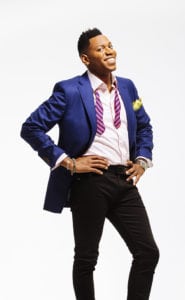
H: So, you sing all these years—close but no cigar. At some point, you have to make a decision: Is this just a pipe dream? Are we just going to sing on Sunday afternoons on somebody’s program, and do we need to be satisfied with that? Maybe that is what God has called us to do? Is it time for us
to settle?
B: Never. There is never a time when it’s time to settle.
H: But did you ever feel like it was the time to settle?
B: I never felt like it was a time to settle because I always believed in plan A. There was never a plan B; there was only a plan A.
H: Plan A is?
B: Work hard, be successful, work hard, get the recognition you need, get paid—get ready, get noticed, get paid. That was always it; that was always it. A wise man told me that.
H: You end up in Knoxville, Tennessee. How did you end up here?
B: My parents’ relationship became a bit rocky and they decided to kind of part ways. We were in Florida, and my mom and dad kept us in church. They were really faith-driven on a lot of things, so when it came down to our moving to Knoxville, my mom simply said a prayer: “God, I know we need to move; something needs to change.” I really credit my mom because she was always hungry and passionate for something new. We grew up in a really small town; everyone knew everyone. A couple of red lights, a couple of gas stations.
H: What time was that?
B: This was Winter Haven, Florida. We grew up in this really small town, in this really small house. It was a poor neighborhood, and a lot of my friends and my mom’s friends and relatives would all get stuck in this area, but my mom always had this dream, this desire, this thing in her that said, “We have to get out of these parameters, get out of this box because there has to be more out there and I’m just crazy enough to believe it, so I’m going
to go see it.”
H: How many siblings do you have?
B: I have six siblings. It’s seven of us in total, and I’m the youngest of all seven. We all come from the same mom and the same dad.
H: Call them by name, in order.
B: My oldest brother is PJ (his name’s Earnest but we call him PJ), then there’s Julius, then Tashika (but we call her Strawberry), then there’s Michael, Ashley, Jonathan, then myself, Chris.
H: You all moved to Knoxville?
B: We all moved to Knoxville with mom. We gave everything away we had in our home. We packed up the bare essentials in a U-Haul truck, and literally moved everything to Knoxville, Tennessee. At the time I was ten, so my brother was eighteen, and he drove all the way from Florida to Knoxville, trailing the U-Haul truck.
H: And you moved in where?
B: We moved in with my cousin, who had a home in a neighborhood called Bexhill. It was all seven of us, plus mom, and my cousin and her two kids, and her husband—twelve of us were living in a four-bedroom house, two bathrooms.
H: How did your parents’ split affect you?
B: I would say it had more of a long-term effect on me than anything. Because everyone around these homes was breaking up; my friends’ parents were divorcing. Everybody around me was going through different relationship issues, and everyone had their own struggles. So when you see divorce after divorce after divorce, that becomes a part of your way of thinking.
H: Here it comes.
B: Here it comes; it’s just a matter of time. I’m going to get married, have children, and then I’m going to divorce, and that’s just life because everybody goes through that.
H: Did that stoke your determination?
B: To be successful in life?
H: Yes.
B: I don’t know. I always saw it as this separate entity; I always saw it as this separate thing. Music was one lane, and then relationship stuff is just something completely different. I always learned, even at a young age, to keep them separate.
H: So you compartmentalize.
B: I very much compartmentalize.
H: Do you compartmentalize because that’s the way you handle it, or do you compartmentalize because you never wanted anything including relationships to get in the way of plan A?
B: I would say both, absolutely. Especially the latter. I would never want anything to get in the way of my career, my dream, my life, my purpose.
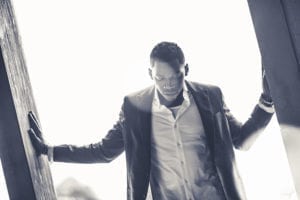
H: What are you running from?
B: I’m running from failure.
H: What are you running to?
B: I’m running to success.
H: Defined as?
B: Defined as wealth: wealth in the spirit, wealth in mind, wealth in body, and wealth in the bank account.
H: What are you running through?
B: I think I’m running through fear. I’m running through fear.
H: So you get to Knoxville, you’re ten years old. Your brother is eighteen. You move into a relative’s house. You’ve got twelve people living in four bedrooms; you’re on top of each other. I bet you don’t feel successful then. What do you think is going to happen?
B: Well, it was promised to me that we would only be there for a couple months.
H: And you were there how long?
B: A little longer than a couple months, but eventually we moved out and we began to travel more and we would go to different cities and states, different churches, and events and we would sing. I felt like we were back on track. We were in a new place, and more people were starting to notice us outside of ‘po’ county Florida—more people, as far north as Ohio and Chicago, as far east as the Carolinas, and as far west as Las Vegas. People were starting to recognize who the Blue Brothers were, and that’s when I began to really feel like we had a shot, like a really big shot, at making it.
H: Did you make it?
B: We weren’t disciplined enough, I believe. At a young age, we lacked the knowledge of the business, and we lacked wisdom. We had integrity, but that wasn’t enough. To say we made it in the way that I desire: we didn’t make it.
H: You’ve been at it for a long time, and it’s not getting close or it doesn’t happen. But you haven’t given up on plan A. Your mother has been an inspiration because she has been thinking outside of the box, believing for you. But you’re still not there. When I met you, I met you when you were probably ten or eleven years old. I saw you guys early on. But when you were in college, you called me.
B: I did. I was at Tennessee Temple University, in my third year at school. I changed my major every year, but I was getting my work done. The Lord just kept tugging at my heart telling me, “I think it’s time for you to leave,” and I’m like, “I don’t understand; it’s my third year in and if I leave now, I just wasted three years of my life.” But I knew that God was doing something; he was shifting something with my family, and I knew I had to be there. Full time. I called you and said “Hallerin, I really feel like I need to come home and really pursue this thing with my brothers.”
H: You called me, and I said that I want to help you find some employment and to be connected. But I remember saying to you that I want you to be around another level of excellence when it comes to music. Enter Paul Jones.
B: You made the phone call, which is crazy to me. Paul Jones is a phenomenal human being; he’s a musical genius, and an icon in my mind. His knowledge of music and of the music businesses is just out of this world. He’s a pure guy, a genuine guy. I went down to Cokesbury United Methodist church within a week, met with Paul Jones, and I started working at Cokesbury Church the following Sunday. I was there for three or four years.
H: And everything changed with that relationship.
B: Absolutely.
H: It was really important for me that you also got experience in the studio. Enter Travis Wyrick.
B: Travis and I became friends. I talk about it today: God’s perfect timing in purpose. The timing of it was just impeccable. I meet you, Paul Jones, and Travis Wyrick. In the same year, within one summer actually, I met three of the most influential men in my entire life. I began to record with Travis. I would go help him out and do background vocals and and learn as much as I could. I would go over there just to watch him. I would wake up at 5:30 a.m. just to go to the gym with Travis so I could be under his musical wisdom. After that, I would linger around long enough just to see if he’d allow me to go back to the house so I could watch him recording.
H: Now you’ve got performance experience with somebody who is really, really good and who is very structured. That was my intent in connecting you with Paul Jones. Then we started working on a plan for you and your brothers. You ended up recording a project together.
B: That was our first official album. It said “Blue Brothers,” and you were a part of that. Your heart has always been the size of planet earth, and I will never forget what you did for my family.
H: But it didn’t take off. We had the Blue Brothers project, and we’re almost there.
B: Almost.
H: I wrote this song called, “You Don’t Have to Know Why.” The lyrics are:
He didn’t solve your problems
the way you thought he would.
He chose a different answer,
and it was twice as good.
See, it wouldn’t be a miracle
if you understood
because then you could do it
for yourself.
You wouldn’t need the
Savior’s help.
You don’t have to know why because the why is not important, you don’t have to know how because how is not a factor, and you don’t have to know when because he controls time. All you need to know is that he is in control. It seems like you thought you had it figured out, but he chose a different answer.
B: He did.
H: I remember you coming to me and saying “I can’t stop, can’t stop, won’t stop.” We were sitting back in the studio of my house, you remember that? You said, “I’m thinking about just going home.” Now did you have any trepidation about how your brothers would feel about that?
B: Absolutely. I struggled with even the thought of going off by myself and doing anything without my brothers. Because I felt like we toiled together, we traveled together, we ran together, we did it all together. We always knew and we were taught to stay together. Everyone said, “Guys, make sure ya’ll stay together no matter what.”
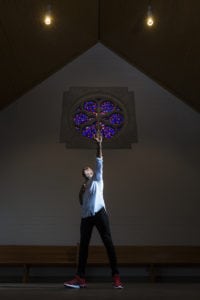
H: So, we have that conversation. I’m always super pragmatic. I say, “are you sure, and have you thought this through?” We went over to Lakeshore Park and you were asking me, “how do you put your life together?” I said, “If you had unlimited time, talent, money, and support, what would you do with your life? ” And I saw you as we started writing down numbers and ideas, and on a couple of them you looked up like, “Do I have permission to pick this?” Do you remember that?
B: I do, because again I felt as if I’d be considered a renegade, a traitor.
H: We sat there, and I wrote down the responsibilities that you currently had, and they were all in a very tight, religious box. And over here was that list of things you said you would really love to explore, and all of those things were outside of that box.
B: And all of the things that were outside of the box gave me the most joy.
H: Right. I drew an arrow and a stick man, and I drew that line outside of the box, and when I drew that line outside of the box, you thought of all the people in that box that you thought you would either have to leave, or that would leave you, if you moved outside the box. What happened that day that you were at the table?
B: Do I have to share that again? I sat there at the table struggling to accept the fact that who I am doesn’t fit inside the box so many other people want me to be in. And tears began to come down my face. I began to weep. I’ve always been one to consider myself a loyal guy and have integrity, and I felt like in that moment I was letting all of that go. I was becoming a man I said I would never become: a liar, a traitor. That was my struggle. Either do what you feel you’ve been created to do, or do what others think you have been created to do. There’s a fine line between inability and accountability: it’s one thing to not have the ability to do certain things—you can’t dance, or you don’t have the wits to be a doctor, or you’re unable to be an engineer. It’s another thing if you have all of those gifts, and the love of God inside your heart, but yet you still choose not to use them.
H: Have you heard Steve Jobs’ quote about living someone else’s dream?
B: No.
H: Here’s what Steve Jobs said: “Your time is limited, so don’t waste it living someone else’s life. Don’t be trapped by dogma, which is living with the results of other people’s thinking. Don’t let the noise of other’s opinions drown out your own
inner voice.”
B: Wow.
H: It sounds like that’s what you were struggling with. Then I asked you a really important question: I said, “Are you ready to tell them?” I said you can’t sneak. You’ve got to have some real conversations. And you were like, “No, I don’t.”
B: I remember saying, “I can just keep doing what I’m doing; they don’t have to know a thing.”
H: The reason I wanted you to have the conversations was because I knew that leaving the box had nothing to do with leaving them. You needed to take them out of the box. You needed to take your limited belief about their capacity for love and destroy that, so you could see how much they really love and support you. And that’s when you were really surprised because I said, “did you talk to your mother, did you talk to your brothers, did you talk to your family, did you talk to your church?” Finally, you did, and you were so blown away because you had them in a box as much as you thought they had you in a box.
B: The unthinkable happened. They all accepted me. We all began to grow. We all stepped outside of that box and we now see love in a different way, in a different light. We don’t place any limits on it, and we don’t place any boundaries on it.
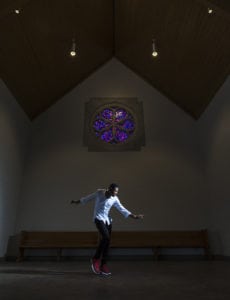
H: So now, at the time of this interview, we go back to Lakeshore. The last time we were there, the chapel was there, and it was all walled in. Now, they’ve turned it into a public space, and they took the walls down off the church. We did the photoshoot there, and when I told you what the metaphor was…
B: …it blew my mind.
H: We were within fifty yards of that
same spot.
B: Yes, we were. I want to say God saw what happened that day and said, “you guys are going to now be the testament of the new movement of the church.”
H: Boom—outside the walls. Once we got outside the box, you started coming over to my house a lot. We started having these conversations about dreams without deadlines, turned into nightmares. Dreams need details and a plan and a deadline. You said, “Well, what do you do?” I said, “First of all, let’s identify the skill sets that you need.” You identified that you wanted to act, you wanted to do music, you wanted to speak, that you had all these things that you wanted to do. I said, “you need to start working on your core competencies, on your map. You need to have structure.” To your credit, you started doing that.
B: I did. I knew I wanted to be an actor, so I remember I ran into a friend of mine a couple of years back at an event with Travis, and we began to talk and I said, “I want to work with you; I really have a passion for acting.” He said, “I teach this class, and it’s going to cost such and such,” so out of my pocket I began to spend money on the class. I began to invest in my future twice a week in acting, out of my pocket.
H: You do know it doesn’t become real, though, until you start investing.
B: Absolutely.
H: You know you believe in something and that you’re committed to something when you are willing to invest time, talent, and treasure. You did the same thing with dance.
B: My fiancé was in town, and we were at the movies. I started dancing at the end of the movie, and I see this other guy dancing. He told me about his dance studio, so I started going to his dance class pretty much every Monday—learning choreography for an hour, and getting as much knowledge and dance information and wisdom as I possibly could.
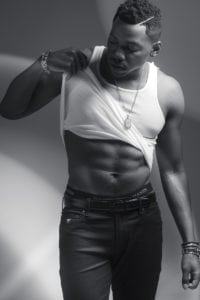
H: And you started going to the gym.
B: I did. It started with Travis. Talk about investing—I didn’t have the extra funds to do that. But I would travel thirty minutes away from my home, and I would go to the gym and hang out with Travis. We would lift weights, and I began to gain a knowledge of human anatomy. Then I got a gym membership, and I just kept going.
H: I asked you to write music every day. You said, “I don’t have the equipment.” I said, “you have Garage Band.” I pulled up Garage Band on my iPad and made a song, and I said, “use the tools…”
B: “…use the tools that you have to get what you need done.” Through that, I learned that you don’t have to wait. Why wait?
H: That’s when I knew you were very serious, when I saw you start to structure your life around your dreams. It went from talk to action. Now you have to try. So here comes The Voice.
B: Here it comes. A buddy of mine, Amy Lynn, made mention of The Voice. We would meet every week to write songs. She messaged me saying we couldn’t meet this particular week. She said to me, “I’m going to try out for The Voice; it’s going to be in Atlanta. You should go try out.” I said, “No, that’s not for me. I’m just going to stay here in Knoxville and just grind, and hopefully somebody will see me some day.” But the funny thing is, the Lord was pulling at my heart to go on to The Voice, to try out. I went to sing at Cokesbury one night, Concord another night, and then another church another night. At each church, I had someone come to me and ask if I’d ever thought about trying out for The Voice. Then my sister called and she said, “Chris, I was praying for you today, and the Lord told me to tell you that you need to try out for The Voice—not American Idol, not America’s Got Talent, not Sunday Best. You need to try out for The Voice.” As she’s telling me this, I had my laptop open, and I said, “Strawberry, you won’t believe it, but I’m actually filling out the form right now.” She said, “Good, I support you a thousand percent.”
H: You called me and said, “I’m going to Atlanta, but my car’s a little sketchy.”
B: It still is. I remember sitting on your porch, and you came out with a set of keys and handed them to me and said, “Here, it’s my truck. Take it.” You reached into your wallet, grabbed a hundred-dollar bill, handed it to me and said, “Make sure you eat.” I will never, ever forget that day because not only was I investing in myself by taking a leap of faith, you helped me start this journey by investing in me. I appreciate that. It changed my life in so many ways.
H: You go down, and you try out. What happened?
B: I was a nervous wreck. I don’t think I told you this, but halfway there I started to turn the car around because I got afraid. I got really scared. I just kept hearing what I was telling myself at home: “you’re not good enough, you won’t make it, they won’t like you.” I called my fiancé, and she helped me, and I think I called you too on the way down, and you helped me once again. I went on down, got into the room with nine different people. I was the only person, the only one, that they called back. I went back to Atlanta. I don’t think I told you this: I just prayed over the car and said, “Lord, just help me make it.” I drove my car down on faith. They said, “We’ll give you a call back if we like you.” Out of all the people that were in the room that auditioned with me that day, I believe I was
the only person to get a call back.
H: You make it through, and you know you’re going to be on the show, and you are just ecstatic. Meanwhile, your fiancé is going through some of the roughest stuff in her life. Talk about Steph.
B: Stephanie has been my rock, has been my gift, has been my strength, has been my everything. It started with bone marrow cancer. She’s in London and I’m in America. I’m having this high life, you know, a grand time. So many awesome things were happening for me, and so many terrible things were happening to her, and there was nothing I could do. The doctors said her cancer was stage three going into stage four—really severe. She just kept fighting. She only stands about five-foot-one, weighs a-hundred-and-twenty pounds soaking wet, a very petite young lady. But her heart is the size of the universe. She just graduated from college, a straight-A student all the way through high school and college. She had the opportunity to go to Cambridge University, NYU, Harvard. She turned all of that down for me. She said, “I don’t know how I would do all of that and have a life with you.” She was there for me. But when she got sick, I feel like I let her down. I still struggle to forgive myself for that because she needed me. I should’ve dropped everything I was doing. I should’ve forgotten about it all, just got on a plane, should’ve gone to see her, but I didn’t.
H: What’s her health status now?
B: She had to have an operation on her brain, the last one. Funny thing is she called me and said, “Chris, I’m about to die.” I tried to encourage her and say, “No, you’re not going to die, everything is going to be okay.” She said, “When I hang up the phone, you’ll know I’m going to die, but I love you. Make sure that whomever you end up with, if they love you half as much as I love you, you’ll be loved for the rest of your life.” About fifteen or twenty minutes later, she flat lined, and I felt it because a part of me just left; a part of me was gone. All I could do was pray. I sat on the living room floor for the entire night, and I didn’t move. I begged God to bring her back. I wouldn’t move, I didn’t eat, I didn’t do anything. No one could call me. I was going to shut myself off from the world until he brought her back, and he did. About a week or two later, she went back to get checked up, and the doctor said that the cancer was gone. She was in remission. For the most part she’s doing a lot better.
H: Back to The Voice. Blind auditions, battle rounds. To advance the story: last day, last blind audition, last slot. Every couple of days you’re calling me saying, “Hey, I keep riding the van over, and I wait all day, and I don’t get to try out.” On that final day, you say, “This is it; if they don’t call me today, Hallerin, I’m coming home.” Last day, last slot—all the judges have selected all of their team members, and Alicia Keys has one left.
B: Unreal, man.
H: Blake and Adam have told her get over it—to just select somebody and move on.
B: All the good ones have already gone; you’ve heard the best. Just pick somebody good, and let’s move on with the show already.
H: You get there that last day. It is the end of the day. If it doesn’t happen right then, you’re going home.
B: Out of all of the days of waiting, that was the most peaceful day I had. I went to bed in peace. I woke up in peace. I don’t think I ate breakfast that day—I was probably a little nervous. But I still had peace in my heart because I just knew: Lord, if you just get me on the stage, I know you’ll do the rest. My name was called.
H: What did you sing?
B: I sang “The Tracks of My Tears” by Smokey Robinson and the Miracles. Beautiful song, and the vocal coach looked at me right before we went out and said, “I need you, right now, to sing your face off.” I will never forget those words. I remember sitting there like, “Okay, why is she saying this?” I thought there were plenty of spaces left. But she looked me in my eyes, square in my eyes, right before I walked in the door, and she said, “I need you to sing your face off.” She took pictures of me as I was walking to the stage. She said, “I don’t know why I took pictures of you. There was something about to happen, something magical.” Before, I had prayed to God, “I want you to choose a coach for me, but Alicia Keys is my number one option.” I get out there and start singing. The crowd was oohing and aahing. Finally, I start focusing on them, and I just begin to be present in the moment, and that’s when I heard the loudest scream I had ever heard in my life. It was because Alicia Keys had turned around.
H: She was the only one that could turn around.
B: But I didn’t know this.
H: Every week you got better. You had a number of great moments, but you were adamant that you wanted some dance. But this show is called The Voice. The audacity! The people on set even said, “Are you sure you want to do ‘24K Magic’? You don’t come behind Bruno. Are you sure you want to do ‘Rhythm Nation’?” I was one of them. Here’s what readers may not know: for both performances, you had one rehearsal, one two-hour rehearsal to learn all of the choreography, all of the blocking. You crushed each one of those. I think it was because three years earlier you had been going to dance lessons, you had been training. All of those investments led up to that final night, that moment. We get to the finale. When I talked to you, you were not that nervous. I was; everybody else was. We get to the night of the selection, and I’ll tell you what I was thinking. I was thinking that everybody you thought you’d lose if you stepped out of the box was right there.
B: Wow, I didn’t think of that.
H: You shed tears about what they would think. PJ was there—you collapsed, he held you up, and I’m sitting there watching you. We’re at Cokesbury; I don’t stand up. I sit in the chair and think, “I’ve got a lot of work. He’s going to come back and say, ‘Now it’s time to get to work’.”
B: You know why? You talk about hard work and dedication—you looked me in my eye before I left for those sixteen weeks and said, “Go win.”
H: I did say that. “Think like a fighter. You don’t have time for all the other stuff. Go win.” So when the confetti comes down and they call your name, you had to answer this question a million times.
B: I’ll tell you what went through my mind at the time. I began to think about all of those people I was afraid of, and that’s when I realized that I wasn’t the one that was trapped in a box. That was the first time I realized we all became free together. I began to weep for them. I began to weep for my coach because I know how bad she wanted to win, and I knew the sacrifice that she made in being patient and waiting on me. I wept for everybody back here in Knoxville, for all of the people across the world that supported Chris Blue on his journey. That moment was for them,
not for me.

Photo by Trae Patton/NBC
H: When Alicia Keys picks up this article to read it, what do you want to say to Alicia Keys and what do you want to say about Alicia Keys?
B: If I had one word to describe Alicia Keys it would definitely be “real”: the love, the light, the joy, the passion, the energy, all of those things that people feel through their television screens about her is real. She really loves, she really cares, and she’s really smart. If she was standing here right now, I would tell her to her face, “Thank you so much for your investment in me. Thank you for making the sacrifice to believe in me without ever knowing me. Thank you for the patience and the time you took to help shape me, craft me, guide me into being a better musician and singer, and into a better man. Thank you for being real and not changing according to the way of a television show. Thank you for being my coach. Thank you for being my friend.” That’s exactly who she is. She is my friend. I thought when the cameras turned off, so would our relationship. But I feel like it’s grown even stronger.
H: What’s next?
B: What’s next is I’m going to New York to work on some more music.
H: You’re going to New York?
B: What’s next is I’m going to New York. We’re going to New York. And I’m really excited about it because I’m ready to work on my music and meet some more amazing people and launch the beginning of the real competition.

I absolutely love this young man. God has big plans for you Chris…just keep allowing him to lead.
Here, Here! God’s perfect timing for everything! Chris, you’re fabulous!
Nice article. Chris, love your story and look forward to seeing you grow and become even more successful. Follow your heart, dreams and God has a plan. Glad Stephanie is doing well.
Chris is the real deal. Thank you for this special article.
Chris is SO deserving of the win.
He’s an HUMBLE man who just needed a mentor.
Thank God for sending what he needed!
Love Chris Christie Blue. Thank God for HIS purpose being REVEALED.